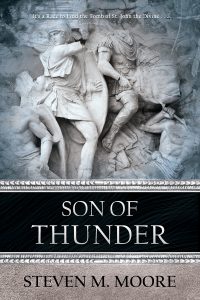Slogans…
I haven’t registered mine: “Around the world and to the stars! In libris libertas!” It describes my books. I write and sell books, in case you didn’t know.
The first phrase tells readers something about the settings in my books. I write mystery, thriller, and sci-fi novels, often combining those genres, and their settings can be anywhere on Earth and beyond. I want to entertain my readers, and I want to do so in many places so we can have fun touring the world and the cosmos together.
Although it’s a bit long, I don’t think that first phrase is a bad one. Versions I discarded had “Travel” and “Travel with me” tacked on at the beginning, but I rejected them because I didn’t want to seem like a tour guide. I also rejected a version with “…the U.S., the world, and to the stars!” I took out “the U.S.” because I want readers anywhere to understand that they can be entertained by my storytelling (even ETs like the ones I’ve created). For example, my “Detectives Chen and Castilblanco” books often start with a homicide in New York City (itself a wonderfully diverse mix of people from everywhere) but can often travel beyond the constraints of Manhattan, even outside the U.S.
Another option I rejected was “…to the planets and beyond!” That seemed a bit limiting because many of my stories go far beyond our own solar system (of course, the planets could be those in another solar system!). There’s an implied mindset too—my own thoughts that human beings should explore space, the final frontier. While it’s true that the ocean deep with its strange flora and fauna also is a mostly unexplored frontier, the oceans are a finite part of Earth (a big part!) and space is basically infinite—that final frontier will always exist, even long after our sun goes nova and turns Earth into a crisp. And what’s possibly out there offers infinite variety for storytelling.
“In libris libertas!” is more important. Yes, it’s in Latin, but it’s easy for any reader to guess it’s important meaning. It’s a statement describing my belief that reading stories and storytelling is liberating, encompassing many meanings of that word. Reading is a freedom human beings can ill afford to lose. That’s why autocrats censor books, from some tyrannical principle in a hick-town high school, to the most murderous despot like Putin. Many politicians don’t want people to read—an educated population only takes so much of their crap. Other politicians are just the opposite, and some even surprise me by being avid readers. Illiterate tweets do not a leader make; an avid reader can be a good leader. Bradbury’s Fahrenheit 451 points out the extreme limits of anti-book thoughts. We have to avoid that extreme at all costs.
I’d used “In libris libertas!” for years before I added the first part. Buildings and institutions often have Latin phrases in their mottos. I think I stole “In libris libertas!” from a public library somewhere; it’s appropriate for libraries, of course. (I wonder if some VIP backing the movie Ad Astra went to the University of Kansas; it’s motto is “Per aspera ad astra.” It’s also the motto of the Spanish Air Force and other institutions, although it could describe the imaginations of most sci-fi writers!)
So the first part of my slogan describes my settings; the second part my belief that books and reading are essential for freedom and equality. I have yet to pare that down to one phrase that says both. When I do, I’ll let readers know.
Does an author need a slogan? Probably not. I use it on my web pages and at the end of my email signature. I’m not sure I derive any marketing or promotion benefits from it. So what? Publishing is a business; storytelling is an art and a quintessential human activity. Actually, that’s a good slogan too!
***
Comments are always welcome.

Son of Thunder. #2 in the “Esther Brookstone Art Detective Series,” this sequel to Rembrandt’s Angel has Esther Brookstone, now retired from Scotland Yard, obsessed with finding St. John the Divine’s tomb, using directions left by the Renaissance artist Sandro Botticelli. Esther’s search, the disciple’s missionary travels, and Botticelli’s trip to the Middle East make for three travel stories that all come together in one surprising climax.
Esther’s paramour, Interpol agent Bastiann van Coevorden, has problems with arms dealers, but he multitasks by trying to keep Esther focused and out of danger. The reader can also learn how their romance progresses, as well as travel back in time to discover a bit about Esther’s past with MI6 during the Cold War.
It might seem like The Da Vinci Code, but the historical references here are confirmed as true and a product of my extensive research. History, archaeology, romance, religion, and art make for a tasty stew in this moving, moralistic mystery/thriller novel soon to be published by Penmore Press. While it can be read independently from the first book, you can learn more about Esther and Bastiann in Rembrandt’s Angel, available in print and ebook formats at Amazon and from the publisher, and in ebook format at Smashwords and the latter’s affiliated retailers (iBooks, B&N, Kobo, etc.) and lenders (Overdrive, etc.). Son of Thunder will be available at the same places (the Kindle version is now available on Amazon while the Smashwords and print versions will soon be released).
Both are entertaining stories for your fall reading.
Around the world and to the stars! In libris libertas!

October 3rd, 2019 at 6:28 am
Addendum to the ad: All versions of Son of Thunder are now available.
r/Steve